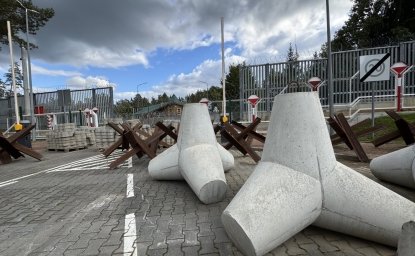In its interim report released on Monday, December 15th, the congressionally appointed Commission on the Strategic Posture of the United States stated that if North Korea and Iran successfully build nuclear arsenals, then "there is a serious possibility of a cascade of proliferation following."
The Commission warns that any new trove of weapons increases the probability that a terrorist group, such as Al Qaeda, will obtain a nuclear bomb. To prevent a nuclear 9-11, the Commission offered several security imperatives and findings for the Congress and Obama administration to consider.
Chartered through the National Defense Authorization Act of 2008, the Commission asserts that the danger of a terror attack with a nuclear weapon has supplanted that of the Cold War-era threat of nuclear war with Russia. That change, according to the Commission, demands a "new assessment of the role nuclear weapons should play in our security."
Congress created the Commission, officially titled the Strategic Posture Review Commission (SPRC), to "examine and make recommendations with respect to the long-term strategic posture of the United States." The SPRC will review the U.S.'s entire strategic posture including military force structure, nonproliferation and counterproliferation activities, missile defense programs, and nuclear weapons arsenal.
Led by former Secretary of Defense William Perry, the SPRC, which also includes former Secretary of Defense James Schlesinger and former Congressman Lee Hamilton, director of the Woodrow Wilson International Center for Scholars, will provide recommendations in a final report due to Congress on April 1, 2009.
With such a renowned committee, the SPRC's final analysis and recommendations likely will have a durable influence in the Obama administration's future nuclear policies and in formulating its congressionally required 2010 nuclear posture review. Additionally, the final report seeks to help build a consensus among the new administration, the Congress, Department of Defense, and the Department of Energy on the future of the U.S.'s nuclear enterprise and how to best combat a terrorist attack with a nuclear weapon.
Noting that a terror group "cannot make a nuclear bomb from scratch," the Commission argues, "the best defense against this threat is to prevent terror groups from acquiring a nuclear bomb or the fissile material from which they could perhaps make a bomb." To keep fissionable material from terrorists, the Commission offers four security imperatives: better protect and reduce nuclear stockpiles of weapons and fissile material; keep new nations from going nuclear; provide effective protection for fissile material; and improve tools to detect clandestine delivery of nuclear weapons and to disable and otherwise defend against them.
Successfully accomplishing these tasks requires an international effort and the report advocates working closely with the International Atomic Energy Agency (IAEA) and other nations, especially Russia. The report suggests that the U.S. increase financial, technical, and political support for the IAEA and start talks with Russia "for further significant reductions in the nuclear arsenals of the two countries."
Although the SPRC's suggestions emphasize defense against a nuclear terror attack, the Commission also acknowledges that both Russia and China will continue to influence the U.S.'s strategic posture. "Although Russia and China do not pose a nuclear threat to the U.S.," one report finding states, "they do have an extensive nuclear capability that could do grievous damage to us (as we to them)." To reduce the danger, the SPRC proposes substantial stockpile reductions both unilaterally and multilaterally with the Russians and other nuclear powers.
In another finding, the Commission maintains that a conventional only U.S. military "is not adequate for deterring nuclear attack" and eliminating nuclear weapons from global arsenals "is extremely difficult to attain and would require a fundamental transformation of the world political order."
Additionally, the SPRC advocates supplementing the Nonproliferation Treaty with "other tools of policy" to better enforce the treaty's nonproliferation directives. The Commission supports an "appropriate" missile defense that is deployed in numbers that do not encourage Russia or China to become more threatening. It also recommends that the U.S. Senate ratify the Comprehensive Test Ban Treaty.
The report does not address other WMD concerns such as chemical or biological weapons and it takes no position on the Reliable Replacement Warhead (RRW) which the Congress halted funding for in 2007 and 2008. However, the SPRC does promote maintaining the Stockpile Stewardship Program (SSP) and Life Extension Program (LEP) for now, but in its final report the Commission will suggest additional ways to preserve the long-term health of the U.S.'s nuclear weapons. "High confidence in stockpile reliability," the report states, "is also vital for making substantial reductions in the size of our stockpile" by allowing deactivation of reserve warheads.
The SPRC interim report takes a pragmatic approach to a vitally important security issue by weaving a strategy of compromise between nuclear disarmament advocates and hawks. With the interim report's approval from both Republican and Democratic members of the House Armed Services Committee, the final report likely will be well received in the Congress and by the Obama administration. However, only time will tell if the Commission's prescriptions will provide a strong enough anchor to prevent the tipping of non-nuclear weapons states from becoming nuclear armed micropowers.


